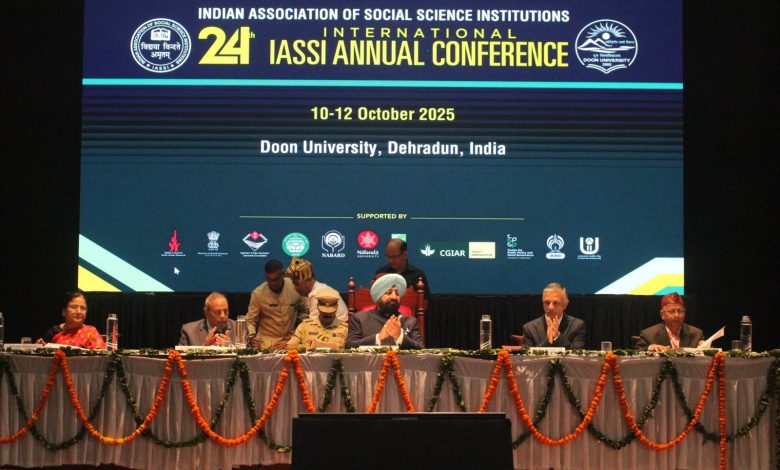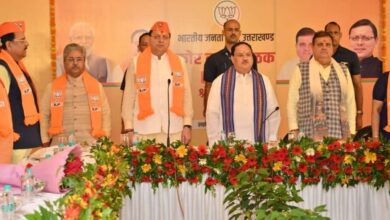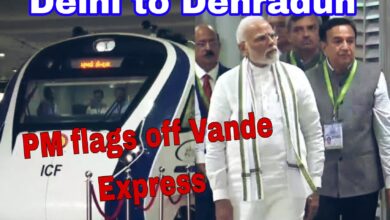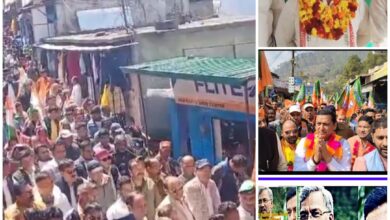Uttarakhand Governor Calls for Youth-Led Climate Resilience Development Model


Dehradun, October 12, 2025 — The Governor of Uttarakhand, Lt. Gen. (Retd.) Gurmit Singh, delivered a compelling valedictory address at the 24th Annual International Conference of the Indian Association of Social Science Institutions (IASSI) at Doon University here today, urging the need for a transformative development model tailored to the Himalayan context.
Addressing academics, researchers, policymakers, and students, the Governor emphasized that the insights generated through this academic deliberation must translate into actionable recommendations to guide effective policymaking.
Asserting that the growth measures must have more humane indicators that reflect the quality of life for the most marginalized, the Governor cited the region’s growing vulnerability to climate change—marked by flash floods and landslides—as a call to reimagine development not through ecological sensitivity and social justice as well.
In an impassioned appeal, Governor urged the youth to lead this change—through innovation, entrepreneurship, and climate action.
He encouraged young scholars to become catalysts of transformation, helping build a sustainable and peaceful Uttarakhand through forward-thinking, ground-level initiatives.
Welcoming the Governor, Doon University Vice Chancellor Professor Surekha Dangwal reaffirmed the university’s commitment to fostering rigorous research and meaningful academic dialogue aimed at informing and shaping public policy.
She emphasized that Doon University consistently strives to bridge the gap between academia and governance by generating evidence-based insights that can contribute to inclusive and effective policy formulation.
Gabriela Ramos, Assistant Director-General for Social and Human Sciences at UNESCO, delivered a keynote address that resonated with the Governor’s vision while framing the challenge in a global context.
Ramos sharply criticized the prevailing global economic framework, arguing that the current “growth paradigm” has entrenched inequality and undermined sustainability.
She asserted that development models that promise trickle-down benefits have failed, pointing to data.
According to Ramos, this concentration is not incidental but a systemic failure that demands fundamental restructuring of how economies are designed.
She further highlighted the rapidly expanding digital divide, noting that while technological innovation is concentrated in a few countries—namely the U.S, U.K. and China.
This imbalance, she argued, deepens existing disparities and leaves vast sections of humanity excluded from opportunities and decision-making power.
Ramos called for a new model of development that treats technology as a public good and focuses on reducing exclusion.
Ramos concluded by outlining the institutional reforms needed to achieve more equitable outcomes, including investment in education and skill-building, especially in the Global South.
Professor R P Mamgain, Dean of School of Social Sciences and Organising Secretary of the Conference stated that over the past three days, the 24th Annual Conference brought together over 400 participants, including social scientists, policymakers, and young researchers from across India and abroad.
Focused on the interconnected themes of climate change, urbanisation, and livelihoods, the conference served as a platform for in-depth discussions on how development can be made more sustainable, inclusive, and responsive to ecological challenges said Mamgain adding further that with more than 250 research papers presented across plenary and parallel sessions, and special panels on climate-induced vulnerabilities and sustainable green pathways, the conference highlighted practical solutions to pressing issues such as climate-resilient agriculture, urban infrastructure, women’s entrepreneurship, and the integration of technology in disaster management and governance.
Those who made significant presentations on the third day included Dr Nagesh Kumar, Director and Chief Executive of Institute of Studies in Industrial Development (New Delhi), Prof S Mahendra Dev Chairman Priminister’s Economic Advisory Council, Professor Sachin Chaturvedi, Vice Chancellor Nadanda University, and economists Dr Ajit Ranade, Dr Sabyasachi Saha, DR S K Mohanty Dr Depankar Sengupa and others.
The event reinforced the need to bridge the gap between research and policy, and to ensure that economic growth translates into real improvements in people’s lives without compromising environmental integrity.
A shared understanding emerged that development and environmental protection must go hand in hand, urban growth must be thoughtfully planned, and economic progress must create better livelihoods for all.






